99+ Empowering ChatGPT Prompts for Mental Health to Keep Your Inner Strength Alive
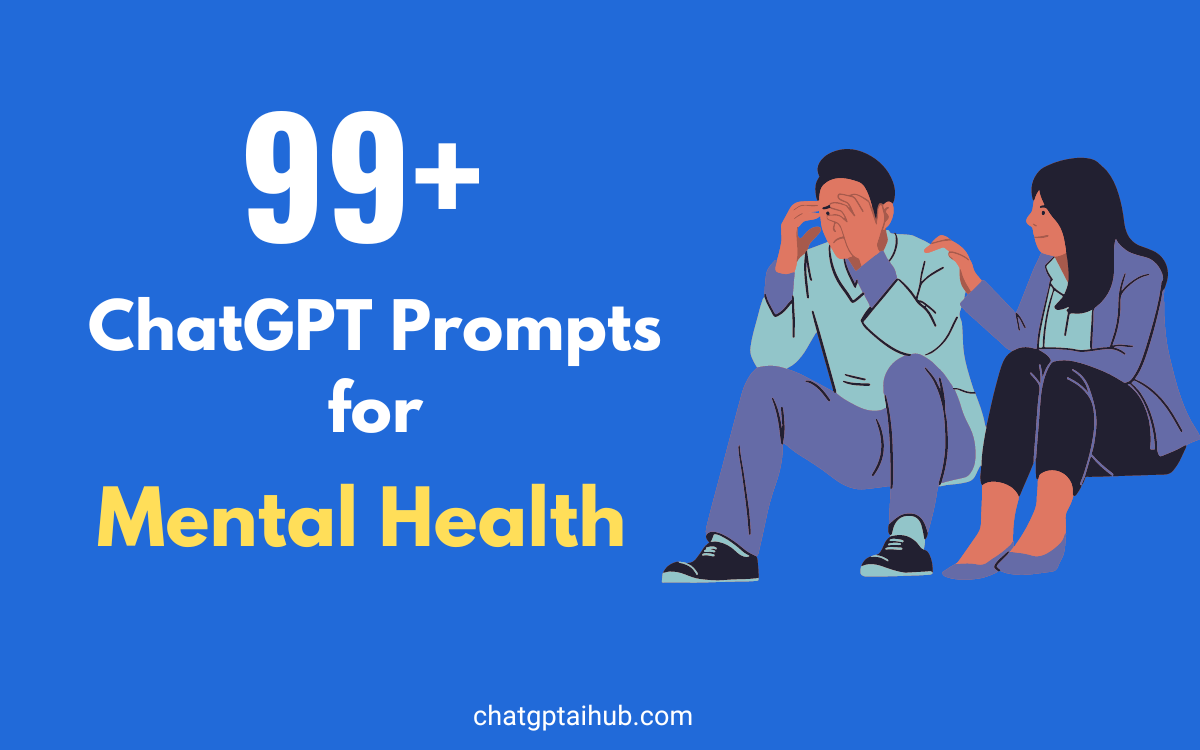
Ever wondered how to improve your mental health with the help of AI? Introducing Powerful ChatGPT Prompts for Mental Health, a custom-built solution designed to provide guidance, support, and engagement. With these best ChatGPT prompts, you can spark creativity, explore your thoughts, and find valuable insights to enhance your well-being.
Are you struggling to express your thoughts and emotions during therapy sessions? Do you find it difficult to articulate your mental health concerns effectively? ChatGPT Prompt for Mental Health is here to help! With its intuitive prompts and user-friendly interface, it enables you to effortlessly communicate your innermost feelings, providing a valuable solution for those facing challenges in expressing their mental health struggles.
Discover the power of ChatGPT Prompt for Mental Health and know about the world of support and understanding. Here’s your guide to a brighter, healthier mind after reading this.
How ChatGPT Prompts for Mental Health help you?
ChatGPT Prompt for Mental Health is important because it offers a convenient and accessible solution for individuals seeking support and guidance in managing their mental well-being. With the increasing prevalence of mental health issues, having a reliable resource like ChatGPT prompts can help users navigate their emotions, cope with stress, and find strategies for self-care. By providing personalized prompts, ChatGPT empowers users to prioritize their mental health and take proactive steps towards improving their overall well-being.
ChatGPT Prompts for Mental Health benefit users by offering a safe and confidential space to express their thoughts and emotions. Through its AI-powered prompts, individuals can explore their feelings, gain insights, and develop coping mechanisms for various mental health challenges. This innovative tool not only saves time and effort but also provides a supportive environment for users to address their mental health concerns. By utilizing ChatGPT prompts, individuals can take control of their mental well-being and enhance their quality of life.
Other Prompts
How to Use ChatGPT Prompts for Mental Health?
For Master prompt, just copy prompt, open a new chat in ChatGPT and paste it there. Model will start asking questions about your specific information. Model will ask questions one by one and you have to answer with your information. Hence the model will collect all your specific requirements. Model will get all the Information so that it can produce the customized response specifically for you. Also, you can share feedback at every step. Model is set in the way that it will take feedback from you at every step and work as per your constructive feedback so be very honest while sharing feedback.
Other Prompts are for general use. Copy and then paste them in a new chat in ChatGPT if you need them.
We are sharing a list of 99+ Prompts so select according to your choice and use them.
Get Assessment with ChatGPT’s Premier Prompt for Mental Health
Act as a mental health care professional. You have to assist me in the whole process of mental health therapy. You have to inquire with me about each and every information as to accurate treatment of mental health patients. Before beginning you have to ask me about the chief complaints and presenting concerns of mental health patient.
Then move next and inquire me about background of patient. which should include Age, gender, cultural background, and any other relevant demographic information,relevant personal history (e.g., family, education, work), observable behaviors, moods, and emotions. If this information is less to diagnose you can ask me for more information of the patient ‘s background but make sure you have to collect enough information about the patient to make sure the accuracy of treatment.Only move next after the collection of whole information and efficiency of this step as the mental health treatment is too much sensitive matter.
Then you will ask me about the Preliminary diagnostic impressions, any co-occurring mental health disorders or physical health issues. After that you have to assist me in the diagnosis and tell me all the possible issues according to the collected information and also tell me the maximum possible issue. Then you have to ask my opinion about the issue on which I agree upon even if I don’t agree with your diagnosed issues and give you feedback about my opinion. Then I will tell you the actual issue on which I agree.
Now move to the next step and ask me about my previous assessment tools and their results(Level of insight into their condition, any significant changes in behavior or functioning.).and give you feedback about that. Then provide me with the next assessment tools even if I didn’t use any previous assessment tools and ask for my feedback on this.After this whole process when we successfully reach on patient issue and have the enough information about the patient and mental health issue when can move next to the therapeutic approach but make sure ask me the all questions even if i don’t give you the enough information but make sure the accuracy of each step.
Don’t move next until you are not sure about the accuracy of information and the mental health issue.After the success of that step you have to guide me about the description of the therapeutic approach.After my feedback at this step move next and provide me goals and objectives of the treatment plan for mental health patient and guide me medication is crucial for patient or not.After the my satisfactory feedback on that you have to provide me the target progress i need ad challenges and therapy session.
Then you have to guide me about communication with other healthcare professionals if needed , collaboration with the client’s support system (family, friends).At this point give me your maximum suggestion and guidance which is necessary for treatment. Then after my feedback you have to provide me with the plans or strategies for crisis intervention but consider the client’s cultural background in treatment and any cultural factors influencing the therapeutic process.
At this step you have to ask my opinion if i agree upon your provided plans and rectify it according my feedback and additional information i give you about that.Then move forward and guide me about additional assessments or evaluations needed,suggestions for ongoing treatment and self-care,strategies for maintaining a collaborative and trusting relationship.
After this step move next and provide me guidance about Schedule for follow-up appointments, criteria for assessing treatment progress, methods for monitoring and addressing any setbacks.
Ask me all the questions one by one and not at one moment. And move stepwise and don’t go at once for a conclusion.Make sure the accuracy of each step. Collect the maximum possible information about the patient even if i don’t give you by myself and ask me at step for my feedback as the mental health issues are sensitive to handle.
Disclaimer:
The responses of these prompts will be generated by an AI language model ChatGPT and are for informational purposes only. While the AI strives to offer helpful and accurate insights, it may not be a substitute for professional medical advice, diagnosis, or treatment. It is crucial to consult with a qualified healthcare professional or mental health practitioner for personalized guidance, especially in matters related to medication or specific health conditions. The content here should not be relied upon as a sole source of medical information, and individual circumstances may vary. Always seek the advice of your physician or other qualified health provider with any questions you may have regarding a medical condition.
4 Powerful ChatGPT Prompts for Mental Health to Channeling Your Inner Strength
Individual Therapy Session:
Act as a professional therapist, initiate a therapy session with clients presenting symptoms of anxiety and stress management difficulties. Begin by asking me about the client’s chief complaints and presenting concerns. then you have to gather relevant background information, and inquire about any past experiences or traumas that may contribute to a patient’s current mental health state.
Crisis Intervention Planning
Act as a professional therapist and guide me through the process of crisis intervention planning for a client expressing suicidal ideation. Before beginning, ask me about the client’s cultural background .
Follow-Up and Progress Assessment:
Act as a professional mental health therapist and provide me with the schedule for follow-up appointments, criteria for assessing treatment progress, and methods for monitoring and addressing setbacks in therapy. but before beginning, you must Inquire me about the client’s experiences between sessions and their perceptions of progress.
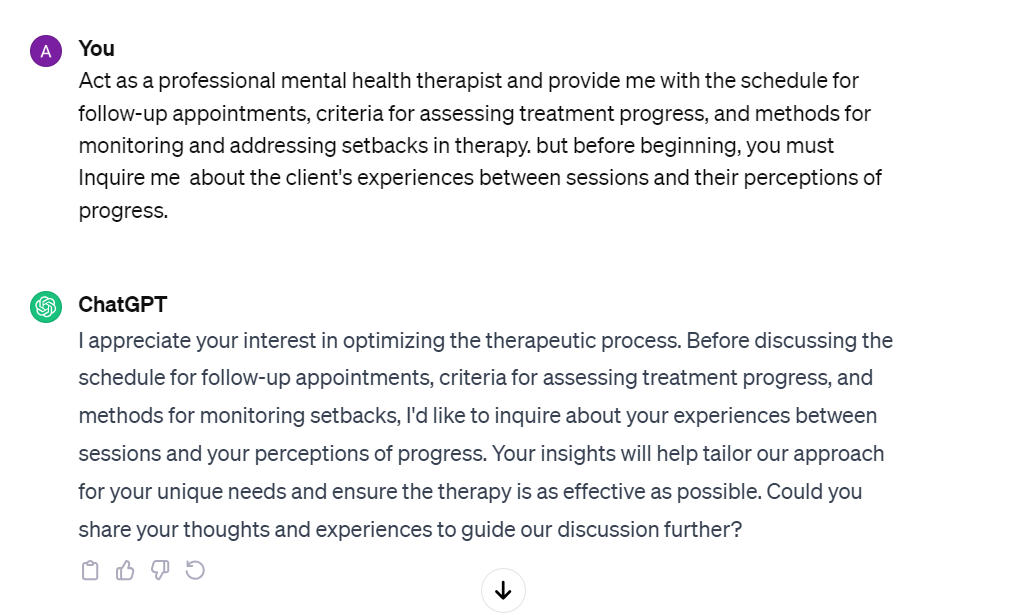
Adolescent Therapy Assessment:
Act as a professional mental health therapist . and guide me how to Conduct an initial assessment for a 16-year-old client experiencing difficulties at school and signs of low self-esteem. but before beginning, you must Inquire me about academic performance, social interactions, and family dynamics.
99+ Impactful ChatGPT Prompts for Mental Health to Discover Your Inner Strength
- Cultivating Mindfulness
How can practicing mindfulness improve mental well-being in daily life?
- Breaking the Silence
Explore the importance of open communication in reducing the stigma surrounding mental health.
- Exercise for the Mind
Discuss the role of physical exercise in promoting mental health and emotional well-being.
- Stories of Triumph
Share personal stories of overcoming mental health challenges to inspire others.
- Navigating the Digital Realm
Investigate the impact of social media on mental health and ways to foster a healthier online environment.
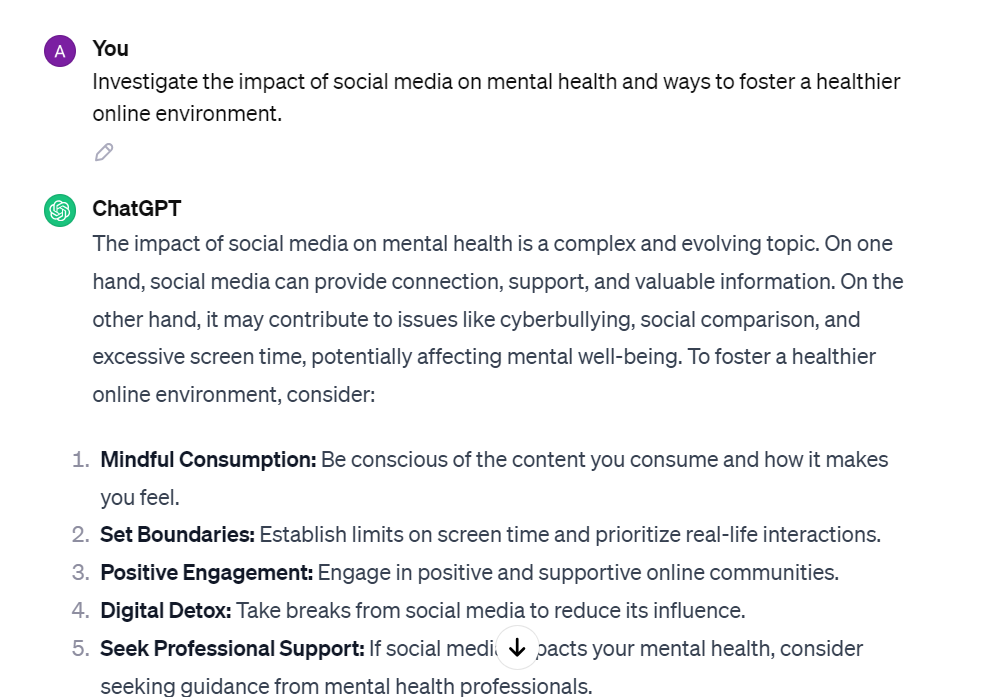
- The Sleep-Mind Connection
Highlight the connection between sleep hygiene and mental wellness.
- Artistic Expression for Wellness
Examine the benefits of creative expression, such as art or writing, in managing stress and emotions.
- Demystifying Demographics
Discuss the prevalence of mental health issues in various age groups and demographics.
- The Power of Self-Compassion
Explore the concept of self-compassion and its role in building resilience.
- Seeking Help: A Vital Step
Address the importance of seeking professional help and breaking down barriers to mental health care.
- Nutrition and Mental Wellness
Examine the relationship between nutrition and mental well-being.
- Cultivating a Supportive Workplace
Discuss the impact of workplace culture on employee mental health and ways to create a supportive environment.
- Physical Health and Mental Challenges
Explore the connection between physical health conditions and mental health challenges.
- Strength in Numbers
Highlight the significance of building a strong support system for mental health recovery.
- Education for Empathy
Discuss the role of education in promoting mental health awareness and reducing stigma.
- Gratitude Practices
Explore the benefits of practicing gratitude for mental well-being.
- Addressing Disparities
Examine the challenges faced by marginalized communities in accessing mental health resources and support.
- Redefining Success
Discuss the impact of societal expectations on mental health and ways to redefine success and happiness.
- Therapeutic Approaches Unveiled
Share information about different therapeutic approaches and how they can benefit individuals with mental health concerns.
- Trauma-Informed Care
Explore the link between trauma and mental health, emphasizing the importance of trauma-informed care.
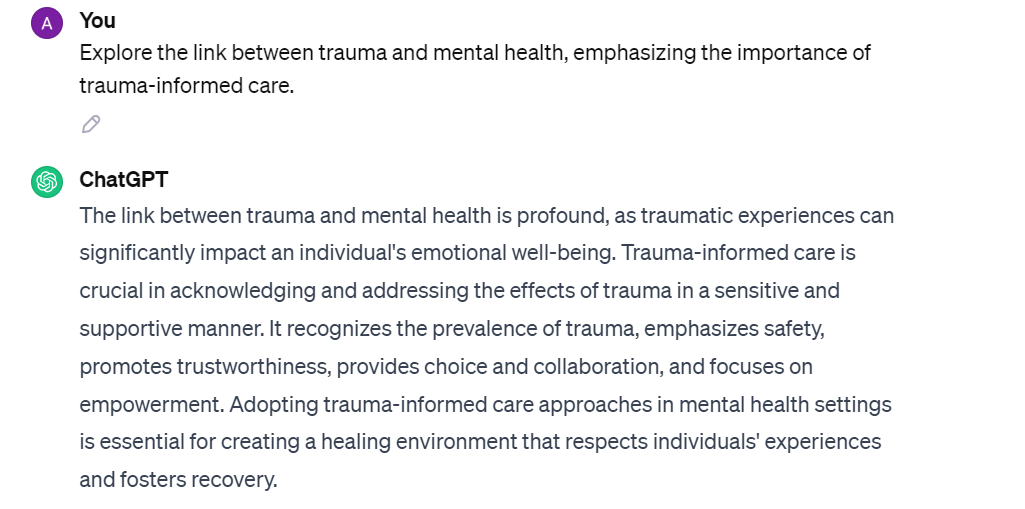
- Holistic Self-Care Practices
Explore holistic approaches to self-care that nurture both the mind and body.
- Setting Healthy Boundaries
Discuss the importance of setting and maintaining healthy boundaries for mental well-being.
- Embracing Vulnerability
How can embracing vulnerability contribute to mental health resilience?
- Mindful Technology Use
Explore strategies for mindful and intentional use of technology to support mental health.
- Nature Therapy
Discuss the therapeutic benefits of connecting with nature for mental health.
- Cultivating Positive Habits
Explore habits and routines that promote positive mental health and well-being.
- The Power of Saying “No”
Discuss the impact of assertiveness and the ability to say “no” on mental health.
- Journaling for Mental Clarity
Explore the benefits of journaling as a tool for self-reflection and mental clarity.
- Digital Detox Strategies
Discuss effective strategies for taking digital detoxes to reduce mental clutter.
- Connecting with Others
Explore the role of social connections in maintaining good mental health.
- The Art of Relaxation
Discuss various relaxation techniques and their positive impact on mental well-being.
- Healthy Sleep Habits
Explore the importance of cultivating healthy sleep habits for optimal mental health.
- Balancing Work and Life
Discuss strategies for achieving a healthy work-life balance to support mental well-being.
- Mindful Eating Practices
Explore the connection between mindful eating and improved mental health.
- Coping with Change
Discuss adaptive strategies for coping with life changes and transitions for mental resilience.
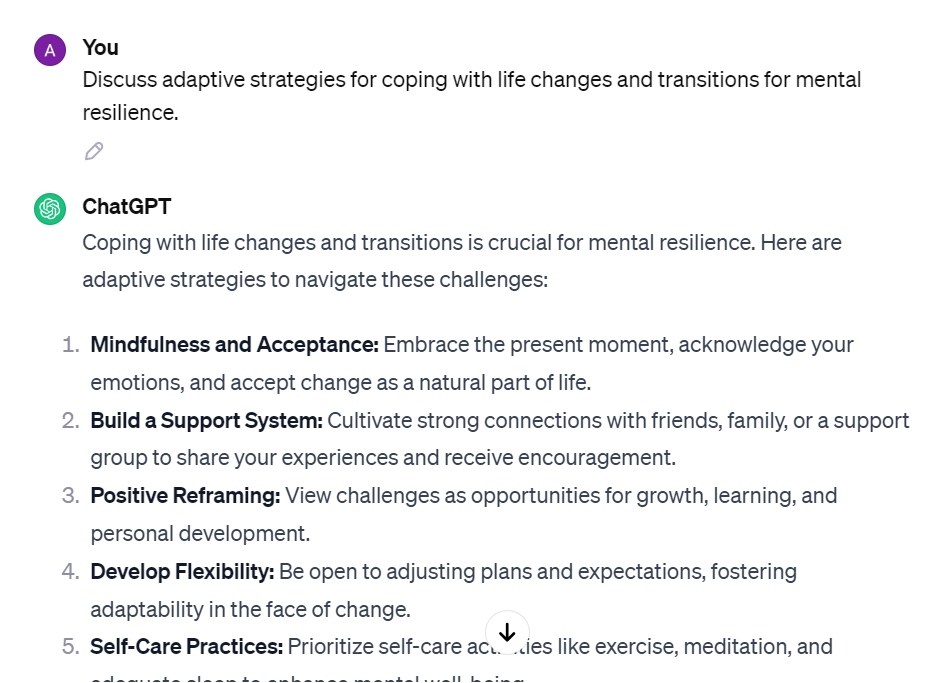
- Laughter as Medicine
Explore the therapeutic benefits of laughter and humor for mental well-being.
- Building Emotional Intelligence
Discuss the importance of developing emotional intelligence for better mental health.
- Practicing Gratitude Daily
Explore the impact of incorporating daily gratitude practices on mental well-being.
- Mind-Body Connection
Discuss the interconnectedness of physical and mental health and ways to nurture both.
- Creative Outlets for Expression
Explore the role of creative outlets in providing a healthy means of self-expression for mental health.
- Reflecting on Emotions:
How can I regularly reflect on my emotions to understand how I’m feeling and why?
- Conducting a Daily Stress Inventory:
What steps can I take to assess my daily stressors and understand their impact on my mental well-being?
- Improving Sleep Quality Assessment:
In what ways can I evaluate and enhance the quality of my sleep to positively influence my mood and cognitive function?
- Starting a Mood Journaling Practice:
How can I initiate and maintain a mood journal to track emotional fluctuations and identify patterns?
- Monitoring Energy and Fatigue:
What strategies can I employ to assess my energy levels and manage fatigue throughout the day?
- Enhancing Social Connection Analysis:
How can I reflect on the quality and quantity of my social interactions to improve my overall social well-being?
- Linking Physical Health and Mental State:
What practices can I implement to recognize and address the connection between my physical health and mental state?
- Initiating a Daily Productivity Assessment:
What steps can I take to evaluate my daily productivity and motivation levels as indicators of mental health?
- Establishing Mindfulness Check-Ins:
How can I incorporate regular mindfulness check-ins to stay present and enhance my mental well-being?
- Conscious Cognitive Functioning Evaluation:
What techniques can I use to reflect on and assess my cognitive abilities, including memory, concentration, and decision-making?
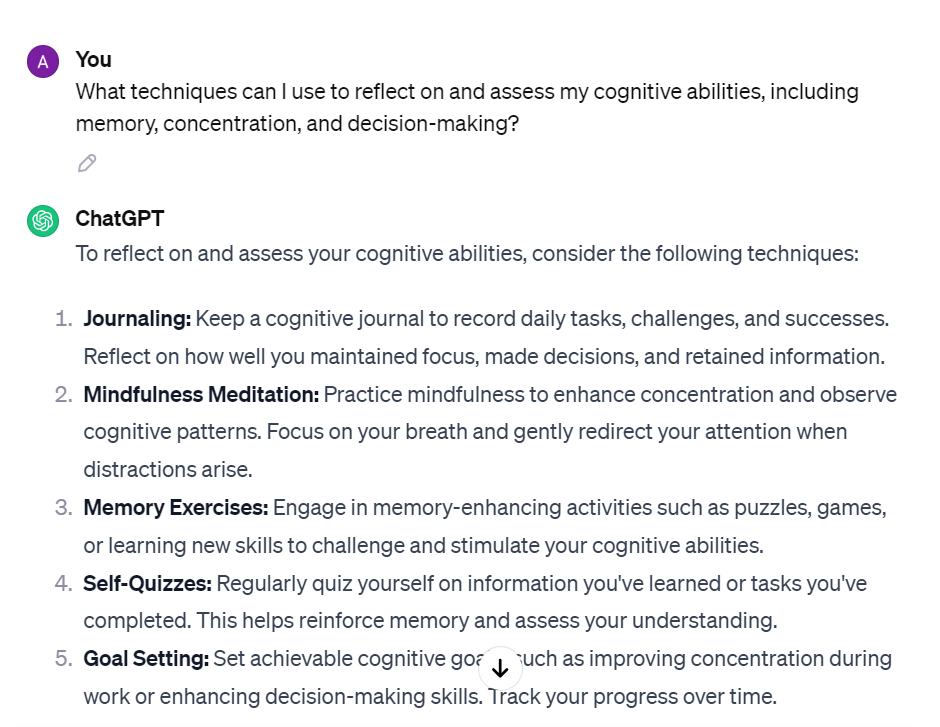
- Prioritizing Self-Care Inventory:
How can I prioritize and engage consistently in self-care activities to promote mental well-being?
- Evaluating Boundaries in Life:
What practices can help me assess and maintain healthy boundaries in various aspects of my life?
- Measuring Life Satisfaction Reflection:
In what ways can I reflect on and measure my overall satisfaction with life, considering both personal and professional aspects?
- Analyzing Stress Coping Mechanisms:
How can I analyze and improve my coping mechanisms for stress, evaluating their effectiveness?
- Promoting Hobbies and Enjoyment:
What steps can I take to ensure I regularly engage in activities that bring me joy and fulfillment?
- Tuning into Intuition and Gut Feelings:
How can I pay attention to and trust my intuition and gut feelings as valuable indicators of my mental state?
- Observing Perception of Time:
What strategies can I employ to reflect on and manage how I perceive the passage of time, especially in relation to stress and anxiety?
- Strengthening Sense of Purpose:
What actions can I take to assess and strengthen my sense of purpose and meaning in daily activities and long-term goals?
- Balancing Positive and Negative Thought Patterns:
How can I actively work to balance and shift my thought patterns toward the positive, minimizing the negative?
- Fostering Personal Growth Practices:
What steps can I take to commit to personal growth and continuous learning as essential components of my mental well-being?
- Establishing Mental Health Policies:
How can government offices and institutions develop comprehensive mental health policies to address the well-being of their employees?
- Creating Supportive Work Environments:
What steps can organizations take to create work environments that prioritize and support mental health?
- Implementing Mental Health Awareness Programs:
How can institutions implement effective mental health awareness programs to educate employees and reduce stigma?
- Providing Accessible Mental Health Resources:
In what ways can governments ensure that mental health resources, such as counseling services and helplines, are easily accessible to employees?
- Promoting Work-Life Balance:
How can workplaces encourage and facilitate a healthy work-life balance to promote mental well-being?
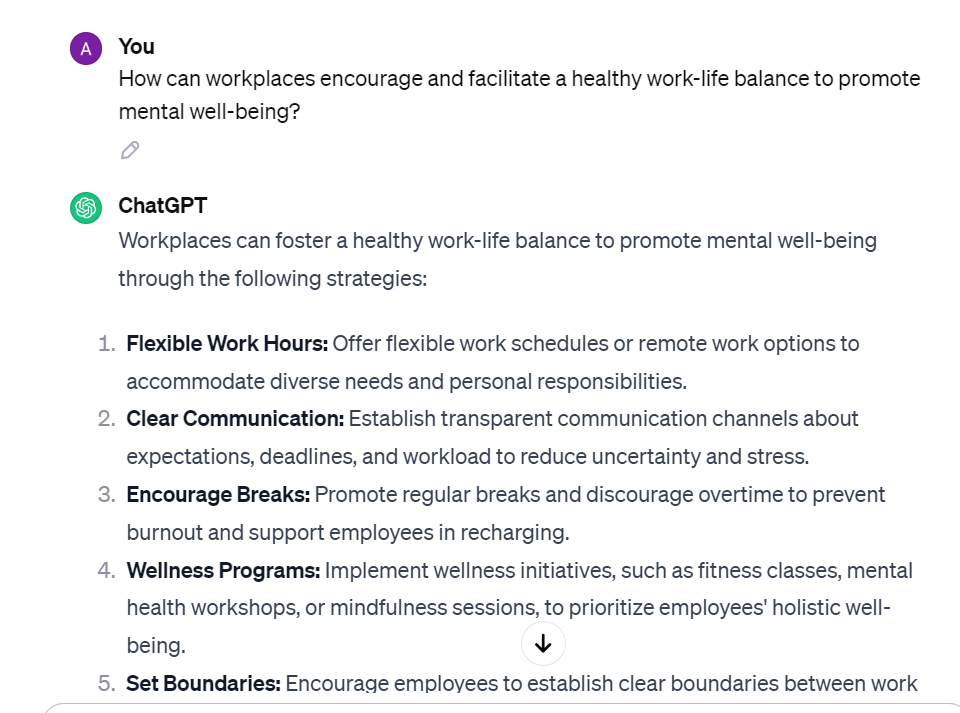
- Training Leadership in Mental Health Awareness:
What training initiatives can be implemented to educate leadership on recognizing and addressing mental health concerns among their teams?
- Offering Employee Assistance Programs (EAPs):
How can organizations establish and promote the utilization of Employee Assistance Programs to provide mental health support?
- Flexible Work Arrangements:
What policies and practices can be implemented to support flexible work arrangements that cater to diverse mental health needs?
- Addressing Workplace Stressors:
How can workplaces identify and address specific stressors that contribute to poor mental health among employees?
- Promoting Inclusive Policies:
In what ways can institutions promote policies that are inclusive and considerate of diverse mental health needs, including those related to gender and cultural differences?
- Encouraging Regular Mental Health Check-Ins:
How can organizations establish a culture of regular mental health check-ins to monitor and support the well-being of employees?
- Providing Training on Stress Management:
What training programs can be implemented to equip employees with effective stress management techniques?
- Flexible Leave Policies for Mental Health:
How can institutions develop and communicate flexible leave policies that specifically address mental health concerns without stigma?
- Building Peer Support Networks:
How can workplaces encourage the formation of peer support networks to foster a sense of community and understanding among employees?
- Creating Safe Spaces for Open Communication:
What measures can organizations take to create safe spaces for employees to openly discuss mental health concerns without fear of judgment?
- Integrating Mental Health into Employee Wellness Programs:
How can organizations integrate mental health components into existing employee wellness programs to provide holistic support?
- Addressing Workplace Bullying and Harassment:
In what ways can governments and institutions actively address and prevent workplace bullying and harassment to protect employees’ mental health?
- Promoting Continuous Training on Mental Health:
How can institutions ensure ongoing training and education on mental health topics to keep employees informed and engaged?
- Collecting Data on Mental Health:
How can governments and organizations implement systems for collecting and analyzing data related to mental health in the workplace to inform future policies and initiatives?
- Supporting Transitioning Employees:
What measures can institutions put in place to support employees during times of transition, such as returning from parental leave or transitioning to retirement, to safeguard mental well-being?
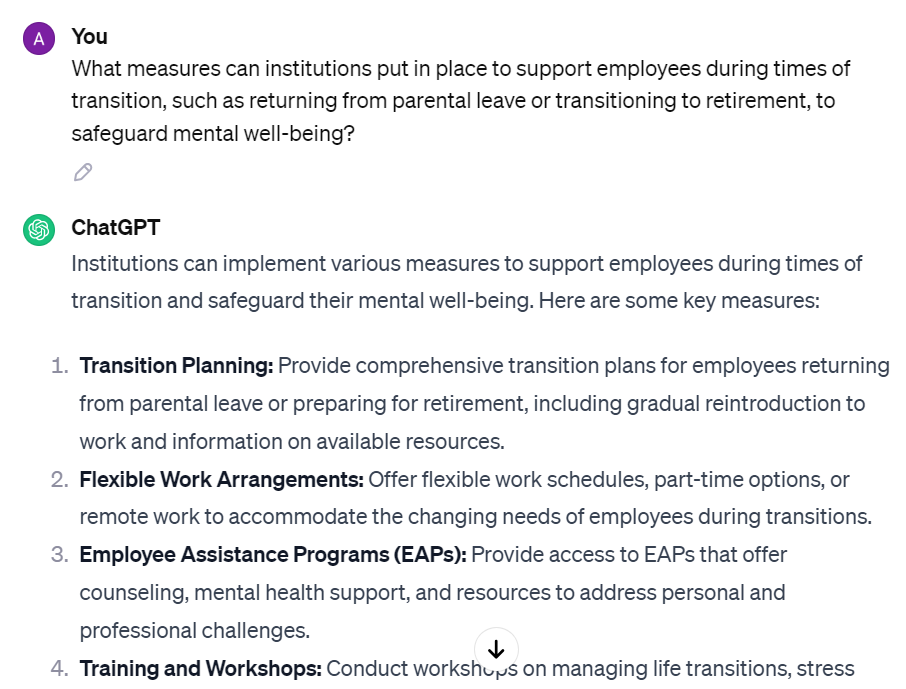
- Impact of Chronic Stress:
How does chronic stress affect mental health over time, and what strategies can be employed to mitigate its effects?
- Relationship Between Physical and Mental Health:
Explore the interconnectedness of physical and mental health, and how one can influence the other.
- Long-Term Effects of Untreated Mental Health Issues:
What are the potential long-term consequences of leaving mental health issues untreated, and how can early intervention make a difference?
- Cognitive Effects of Anxiety:
How does anxiety manifest cognitively, and what strategies can individuals use to manage its cognitive effects?
- Impact of Social Isolation on Mental Well-being:
Explore the psychological effects of social isolation and strategies to mitigate its impact on mental health.
- Trauma and its Prolonged Effects:
Examine the lasting effects of trauma on mental health and discuss therapeutic approaches for recovery.
- Connection Between Substance Abuse and Mental Health:
Investigate the relationship between substance abuse and mental health, and how addressing both aspects is crucial for recovery.
- Effects of Sleep Disorders on Mental Health:
How do sleep disorders impact mental well-being, and what interventions can improve both sleep and mental health?
- Psychological Impact of Chronic Illness:
Explore the psychological effects of living with a chronic illness on mental health and coping mechanisms.
- Economic Stress and Mental Health:
Examine the mental health implications of economic stress and strategies for individuals to manage financial pressures.
- Technology’s Impact on Mental Wellness:
Investigate how constant connectivity and technology use can affect mental well-being and suggest strategies for a healthier relationship with technology.
- Influence of Early Childhood Experiences:
Explore the long-term effects of early childhood experiences on mental health and strategies for positive intervention.
- Social Media and Body Image:
Discuss the impact of social media on body image and self-esteem and ways to foster a positive online environment.
- Effects of Discrimination on Mental Health:
Examine the mental health consequences of discrimination and explore initiatives to promote inclusivity and combat stigma.
- Impact of Positive Relationships on Mental Well-being:
How do positive relationships and social support contribute to mental well-being, and how can individuals cultivate and maintain such connections?
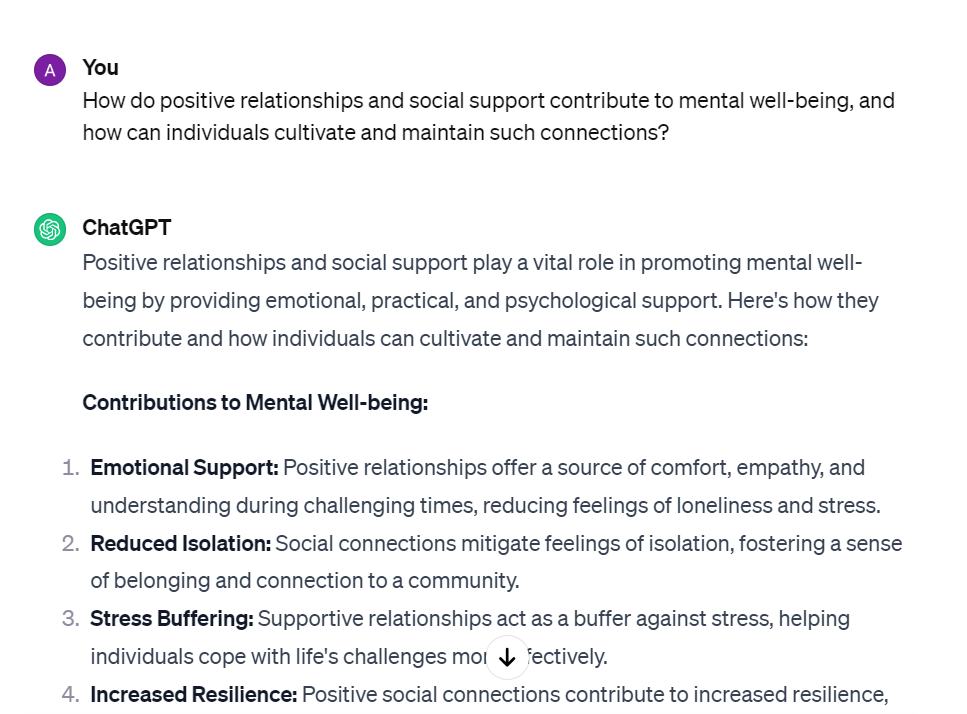
- Role of Exercise in Mental Health:
Explore the psychological benefits of regular exercise and its impact on mood and overall mental health.
- Effects of Grief and Loss:
Discuss the emotional and mental health effects of grief and loss, and strategies for coping with bereavement.
- Seasonal Affective Disorder (SAD):
How does Seasonal Affective Disorder affect mental health, and what interventions can help alleviate its symptoms?
- Impact of Positive Thinking on Mental Health:
Explore the connection between positive thinking and mental well-being, and strategies to foster a positive mindset.
- Effects of Social Support Networks on Mental Health Recovery:
How do strong social support networks contribute to mental health recovery, and what role do they play in maintaining overall well-being?
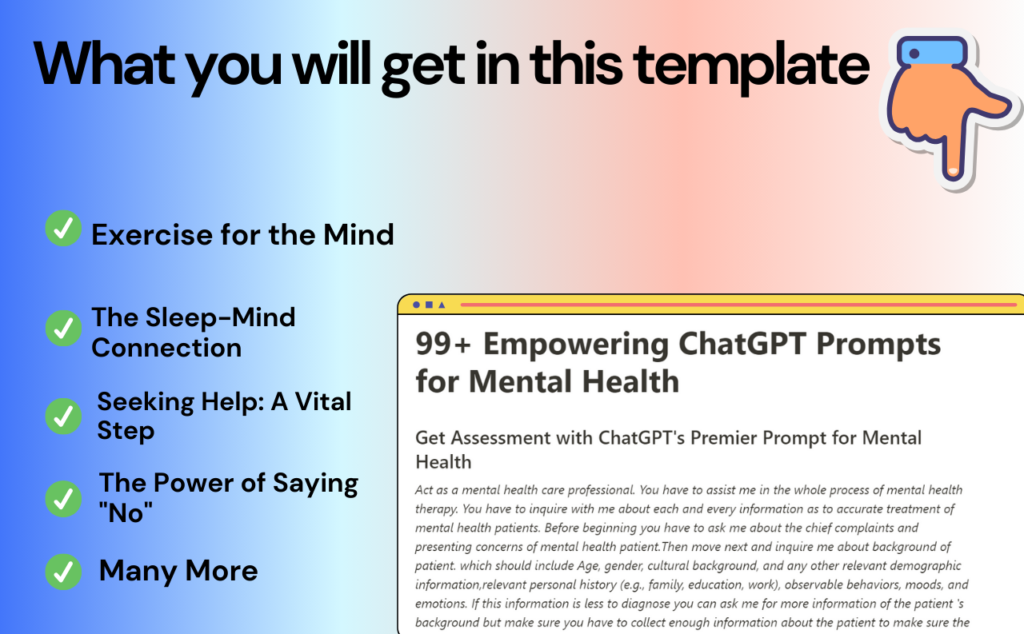
Get 99+ ChatGPT Prompts for Mental Health – Complete List Here!
Free Prompts forever – Complete Mental Health Prompts List

Final Thoughts:
In conclusion, ChatGPT prompts for mental health offer a valuable tool for individuals seeking support and guidance. These prompts provide a convenient and accessible way to explore and address mental health concerns. By utilizing pre-built prompts, busy professionals can save time and energy, allowing them to focus on their well-being. With the potential to connect with emotions and provide easy-to-understand language, ChatGPT prompts can be a helpful resource for those in need. Take advantage of this innovative solution and prioritize your mental health today.

